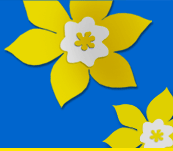Susan Holmes
As a peer-support volunteer, Susan Holmes is often asked by mothers who have been newly diagnosed with cancer: Should I tell my kids?
“I tell them that you have to do what’s right for you. I knew I had to tell my boys. It was really crucial to me to tell them immediately.” says the mother of three now grown boys. “I do know, as a teacher, that kids know when something is amiss. But lots of people choose not to, and that’s their choice.”
In August 1999, Susan was diagnosed with Stage 0 cervical cancer. Scheduled to have a hysterectomy in October, Susan and her husband prepared Thanksgiving dinner a week early so that the family would not miss out on turkey. At that point in her life, she was taking things pragmatically. “I knew that my cancer was going to be taken care of. The diagnosis wasn’t a life-altering event for me in August or October.”
But it did become life-altering in November. That’s when Susan was informed by her doctor that pathology reports showed her cancer was in fact at Stage 3 and had spread. “I got that phone call just before my son’s birthday party. “At the time, I had ten 10-year-old boys coming over. I didn’t really have time to think about it that day,” she recalls. Later, Susan did. “When they say Stage 3 or 4, it gets scary.”
A session of radiation treatments shortly followed. And it wasn’t long before Susan was back at work teaching. Although she was feeling better physically, Susan knew that she needed some emotional support. So she spoke to the social worker at the cancer clinic, who put her in touch with a new program, CancerConnection, where she was trained to support other cancer patients. “That was one of the first times that I had spoken to someone who had the same cancer as me. It became an important outlet for me. It was good to talk to someone. It normalizes the things I had felt.” The Regina, Saskatchewan native became a CancerConnection (now called Peer Support) volunteer and trainer herself. “I know it was good for me and it’s important for others, too.”
What also really helped Susan was the strength she drew from her husband and sons. She remembers one evening when, just she and her husband were at home, she had allowed herself a good cry. “I was on the floor in fetal position. I was just sobbing. I had always made it a point not to let my boys see me completely broken down. But then one of them came home unexpectedly and found me. He said, ‘Mom, it’s okay, you’re going to be alright.’ That to me was a real pivotal point. Since then, my boys are very close to me. I don’t know if we would have been so close if not for having cancer.”
As a nine-year survivor, Susan is determined to live her life to the fullest. She recently finished her Master’s degree in education and is celebrating with a hiking trip to the Incan ruins of Machu Picchu in Peru. “It’s not pleasant to think about dying. But it gives you a chance to think how good it is to be alive. I know cancer did that for me.”





